Peter McKenna, new northern region police commander, reveals priorities as he starts top job
The man responsible for 2300 police officers from The Central Coast to Tweed Heads has revealed his plans for crime prevention in the region.
Newcastle
Don't miss out on the headlines from Newcastle. Followed categories will be added to My News.
Perched next to a Parramatta Eels rugby league ball in a cabinet inside his new office overlooking Newcastle Beach is Peter McKenna’s latest gift – an emu egg painted with the highly-skilled hand of an Aboriginal artist he knew from his time in Dubbo.
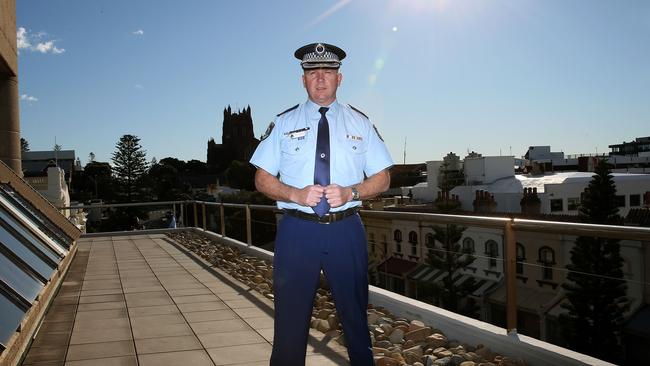
If you take away a prominent Eels logo — McKenna’s favourite footy team — the egg is also emblazoned with heartfelt messages and meanings told through ancient art.
It is a quiet and personal thank you to the 30-year police veteran for his time in breaking down barriers between law enforcement and indigenous communities, including a much-lauded youth program, in central west NSW.
Adorning a wall less than two metres away from the egg is an image of a group of uniformed officers politely posing for a photograph after another long and winding mission – the hunt and capture of notorious fugitive and double killer Malcolm Naden in the Barrington Tops.
Both are poignant glimpses into what helps make the new Northern Region police commander tick – a deep knowledge of the need for real and trusted community connection mixed in with decades of boots-on-the-ground operational policing experience to catch the worst of crooks.
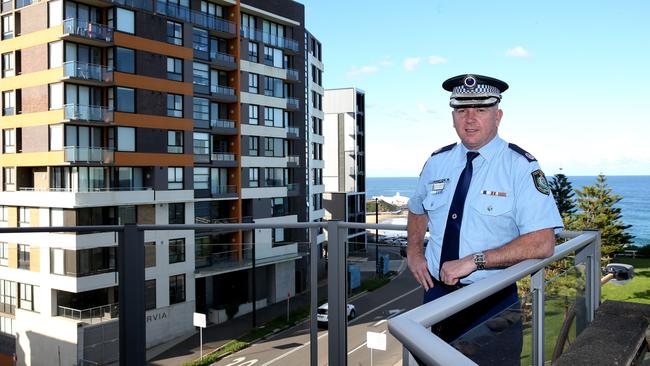
Assistant Commissioner McKenna is less than a fortnight into his tenure looking after the huge Northern Region, which stretches from the Hawkesbury River to the Queensland border and looks after 11 police districts and about 2300 police officers and staff, following the retirement of Max Mitchell.
And even though McKenna knows parts of the area well after working at Forster, Taree, Lismore and Tweed Heads, he is patient about any personal ideas he may wish to stamp across the region.
“The region is dynamic, there is no doubt about that,’’ McKenna says. “You have got that Central Coast-Newcastle area with Newcastle as one of the biggest cities in Australia, the commuter traffic up and down the M1 with the main arterial route to Queensland, we have got the tourist populations all the way up the coast with the popular holiday destinations, we have got some of the oldest and most vulnerable populations and then we have got some rural
areas, some towns and hamlets, we have significant Aboriginal communities, we have got jails, we have got airports, so we have got a bit of everything.
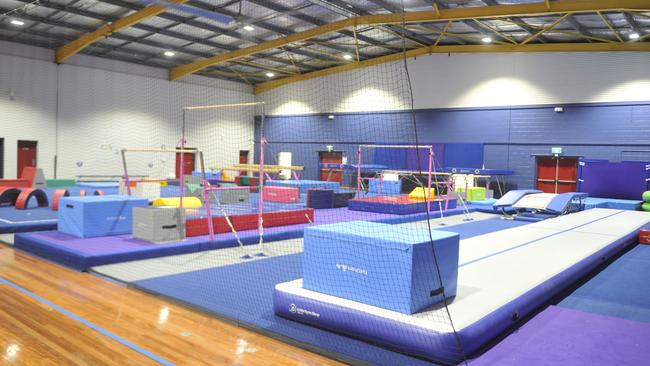
“But what we have also got is 11 police districts that encompass that whole region and 11 very experienced district commanders who are there taking care of business.
“They own the ground and they are doing really well. My job is to support them and to ensure we are all working together to keep the community safe and to make sure we are not giving any criminals a chance.’’
McKenna is affable and warm. The troops like him. But when he talks about crime, the game face quickly appears.
He knows it is as much about perception as it is figures. And he knows the community has long-held beliefs on how police should do their job.
And possibly how he should be doing his new job.
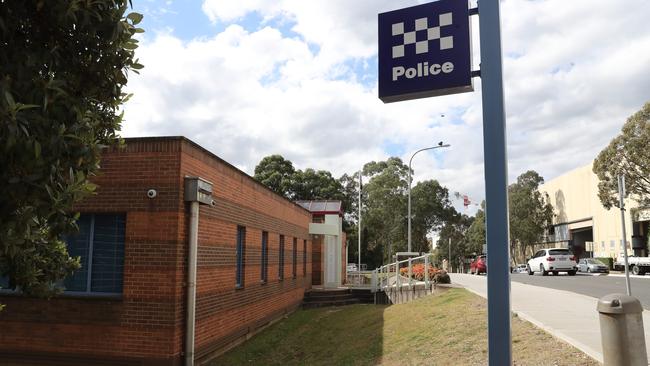
“The first thing that comes to mind is what always comes to mind and that is we focus strongly on crime reduction,’’ McKenna says.
“It is a strong focus on that in-your-face policing for those crooks and criminals out there who want to harm the community. And it is looking after the good people of the community.
“That has worked for my career. It has worked for well before I joined the police and it will work long after I leave it.
“We don’t wait for the phone to ring before we are out there attacking crime. We are always thinking about being preventative.
“It is 2021 and there are so many things happening out in the community, we don’t want to be tied into police stations and just behind counters, we want to be out there mobile and agile and getting on the front foot.
“We want to be seen so that the community understands that the police are out there and out there in numbers and we are doing everything we can to not only keep them safe but make them feel safe.”
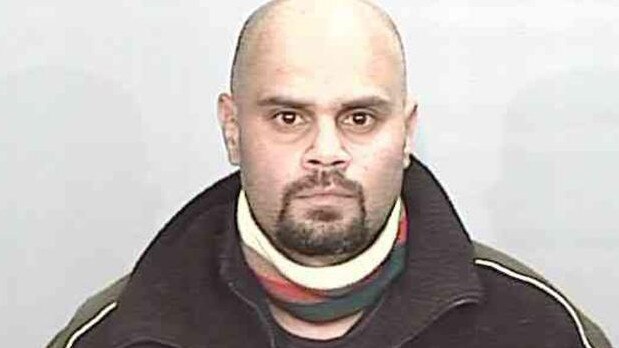
McKenna started at Castle Hill in 1990 but cut his teeth in criminal investigations in the state’s north from 1997.
By 2002 he was promoted to detective sergeant at Forster and then took on the crime manager’s role – looking after all criminal investigations in the Manning-Great Lakes command – in 2006.
He was still in the job during Strike Force Durkin, the biggest manhunt in Australian history for fugitive Malcolm Naden through the Barrington Tops.
And was there for Naden’s early morning arrest in 2012.
McKenna’s arrival in Newcastle comes with fresh concerns of an imminent bikie turf war over the lucrative drug trade along the east coast.
And it comes after Strike Force Raptor North, set up in 2018 for another turf war, had finished it’s time in the Hunter.
“Raptor will come as we need them to come,’’ McKenna says.
“We are part of the NSW Police Force, we will get every resource here. I have got zero tolerance for outlaw motorcycle gangs who want to commit crime and cause harm to people and every opportunity we get to disrupt them, to arrest, charge and lock them up we will do that.
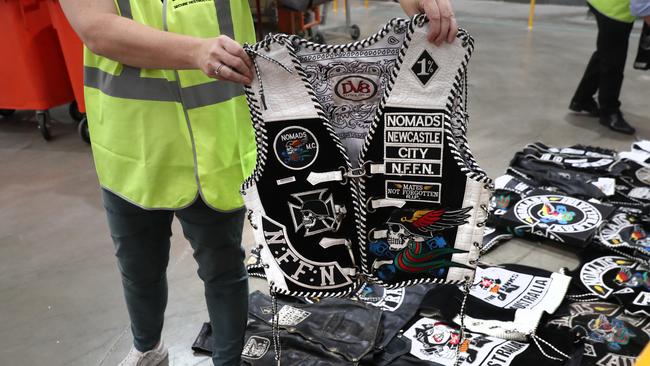
“I don’t have any tolerance for people who want to get together in groups and flout the law.
“It won’t happen under my watch and it will be clear to all the police districts that is my stance on it. Having said that, I know the police here are well trained in that already.’’
He later added: “We have got a few thousand police up here on our own and
we are bigger than any gang that wants to decide to come up and down the coast.’’
But even though bikies and organised crime may take over a lot of headlines, it could be argued there were more important issues facing day to day policing.
It includes the scourge of domestic violence, and McKenna is keen to put out a message.
“Gone are the days of domestic violence being someone reporting it and police going and dealing with that issue in isolation,’’ McKenna says.
“Today, we are looking at who has apprehended violence orders, who is on bail for domestic violence.
“We are out there knocking on doors making sure they are doing the right thing. Letting them know that if they breach those orders or their bail conditions that we will be there to take action.
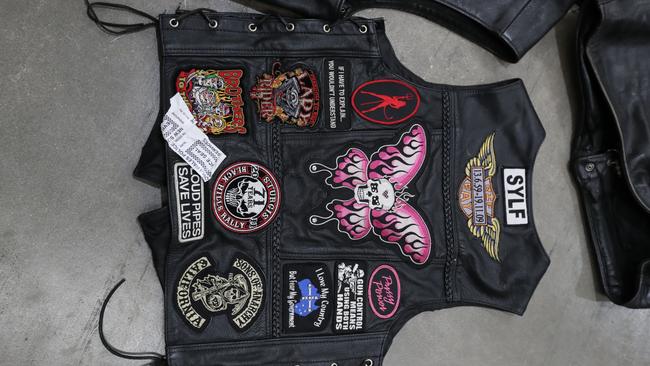
“So, there is a great example of getting on the front foot with a crime that previously was something that people didn’t want to report or there would not be action taken.’’
McKenna is also passionate about reducing youth crime, something that he did extraordinarily well in Dubbo with an outreach program which was embraced by indigenous communities.
“It is also about doing things possibly outside of the box that has been traditional policing and that is working with the kids, working with the youth,’’ he says.
“Getting them to see the police in a different light and getting police to see them in a different light.
“Working through our rise up programs at our PCYCs. I really want to see the whole region engaged in that because whilst I think that youth will get to a certain age where they need to own the consequences of their actions, we should never give up on them.
“And we should always be there to try to get them back on track when we can.
“Because a lot of them, through no fault of their own, just through circumstance, find themselves in a very hard life.
“And if we can be there to help them, to put them in touch with the right resources, for them not see us in that antagonistic light but perhaps to see us people are there to help, then we might just make a difference in getting some of these kids back on track and on the straight and narrow space as well.’’
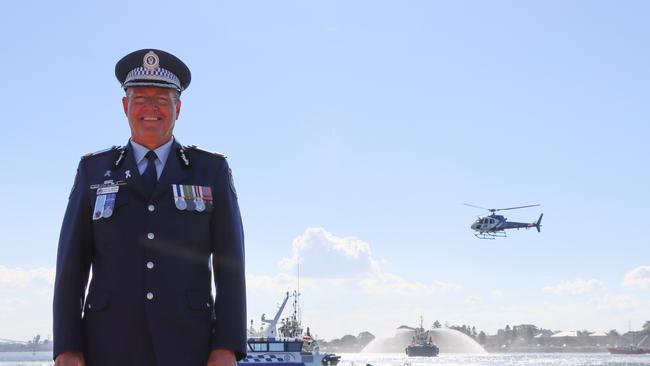
But again, there is a disclaimer: “Policing today is quite simply about that prevention, disruption and response.
“And if we just go to that response part, we just need to make sure we are taking the appropriate action when it needs to be taken.
“It is all well and good to be doing all the prevention stuff but at the end of the day we are still law enforcement, we are still a police force, and we will lock up crooks who are doing harm to the community.
“We will put them before the courts, we will use the bail act, we will do all the things we have the power to do to make sure the community is safe.’’
McKenna’s wife and teenage daughters — his own team as he puts it — will join him in the Hunter shortly.
And he will also find time to wipe the dust off the surf ski for a paddle, some boxing to get himself fit, and his other great passion – adventure motorbike riding.
And he sums himself up succinctly: “Here I am, 30 years in the cops, operational my whole service, and am passionate about driving down crime, catching criminals, looking after communities, keeping people safe, a soft spot for the kids and getting them back on track after they own their consequences, and my philosophy really is we don’t take a backward step.’’


